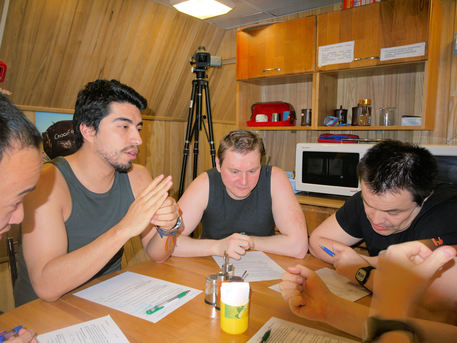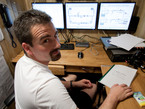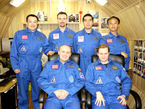Mars500
Keep the daily routine!
 © ESA |
The psychological issues are mapped with different kinds of questionnaires. Mars500 crew has gathered around the big table to fill one of the forms.
“We could have continued easily our mission,” says Cyrille Fournier, one of the two European crew members in 105-day-study. “The motivation is the key issue. It is also important to do always something. I had too much to do in the facility - I didn’t have any time to wander around and watch time passing. Another important thing is daily routine. When you are following that, you can basically just go on, almost indefinitely.”
“Of course we had highs and lows during the mission,” continues Oliver Knickel, other European 105-day crewmember. “In the beginning we were very enthusiastic and then again in the end, when only few days were remaining.”
The most difficult moments during their isolation were in the middle, about six to eight weeks from the beginning. “You can go over these phases and have a successful mission only as a crew. So, my advice to the current team is simple: think what you can do for your crewmates,” states Oliver.
“During the mission, you’re colleagues and everybody is acting professionally, but afterwards you’re friends,” Cyrille concludes. “We’re all still very close now as friends. It was a great experience! I wish all the best for the new crew inside the ‘spacecraft’”.
Source: ESA
Mars500
Keep the daily routine!
 © ESA |
The psychological issues are mapped with different kinds of questionnaires. Mars500 crew has gathered around the big table to fill one of the forms.
“We could have continued easily our mission,” says Cyrille Fournier, one of the two European crew members in 105-day-study. “The motivation is the key issue. It is also important to do always something. I had too much to do in the facility - I didn’t have any time to wander around and watch time passing. Another important thing is daily routine. When you are following that, you can basically just go on, almost indefinitely.”
“Of course we had highs and lows during the mission,” continues Oliver Knickel, other European 105-day crewmember. “In the beginning we were very enthusiastic and then again in the end, when only few days were remaining.”
The most difficult moments during their isolation were in the middle, about six to eight weeks from the beginning. “You can go over these phases and have a successful mission only as a crew. So, my advice to the current team is simple: think what you can do for your crewmates,” states Oliver.
“During the mission, you’re colleagues and everybody is acting professionally, but afterwards you’re friends,” Cyrille concludes. “We’re all still very close now as friends. It was a great experience! I wish all the best for the new crew inside the ‘spacecraft’”.
Source: ESA










